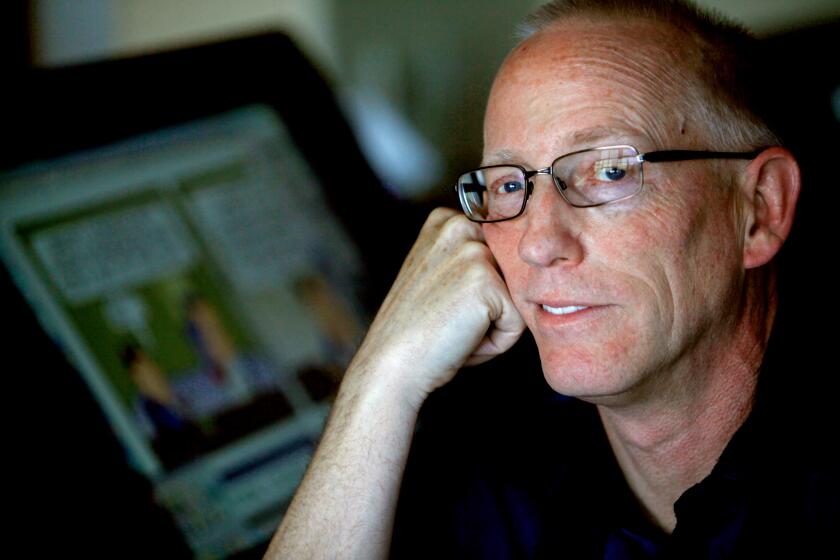Objectively Speaking
- Share via
The press is under fire -- again (and again). Last week, CBS News was officially chastised by former Associated Press chief Louis Boccardi and former U.S. Atty. Gen. Richard Thornburgh for shoddy reporting followed by “rigid and blind” stonewalling on George W. Bush’s Air National Guard record, and several executives and producers were defenestrated accordingly. In 2003 and 2004, respectively, the New York Times’ top editors, Howell Raines and Gerald Boyd, and USA Today’s Karen Jurgenson bit the dust for overlooking (rather than overseeing) the serial lies of their employees, Jayson Blair and Jack Kelley.
Meanwhile, the left thinks that top media pumped up the story of Iraqi weapons and Swift boat deceptions -- even the New York Times’ editor copped to the first charge -- and the right thinks that the press plumped for John Kerry in last year’s election. Virtually no one on any side can be found to defend commentator Armstrong Williams for taking $240,000 from the Department of Education to promote the administration’s No Child Left Behind program.
Meanwhile, newspaper circulation slumps year after year, and so does the aging audience for network news. It would seem that the public is voting no-confidence in the old-fogy news institutions -- that’s certainly what Fox News would have you believe.
Some go so far as to suggest that the very ideal of fair-minded, intelligent and comprehensive news is and ought to be junked.
But rumors of the death of truth -- at least the death of aspirations for truth -- in favor of mere “opinion” or “perspective” or “take” are greatly exaggerated.
The crowning ideal of the American news business -- that there is such a thing as objective journalism -- persists amid the terrible pressures to cut corners in the shortsighted lust for competitive advantage. Despite the evident frailties of mainstream journalism, even those who operate around its margins -- bloggers, Op-Ed writers, even some of the more opinionated sectors of cable -- are still completely dependent on it and still believe they’re getting some truth there. (Where would Bill O’Reilly or Al Franken be without a daily newspaper?)
And so it is even for the reporting of news scandal. If you are one of the many who, for one reason or another, doubt that CBS News, say, is objective, or go so far as to argue that there’s no such thing as objectivity in the first place, don’t turn to the Boccardi-Thornburgh report for confirmation.
In fact, the report illustrates the opposite. Boccardi, Thornburgh and their lawyer collaborators relied on journalistic fundamentals to try to get to the bottom of what went wrong at CBS News. They interviewed sources, assessed their motives, canvassed experts, tried to resolve discrepancies. They made factual claims, asking why as well as who, what, where and when. They didn’t pop off -- they investigated. They were not guilty of the “myopic zeal” for a scoop of which they convincingly accused the program’s producers. They pursued not attitude but truth.
In one of their least-noticed assertions, they also admitted some of what they didn’t know. They were “not able to reach a definitive conclusion as to the authenticity of the Killian documents” -- the much-disputed basis for the bulk of the notorious “60 Minutes Wednesday” report. They can also be fairly criticized -- like much other journalism -- for refusing to go beyond the immediate story to connect dots. In the furor surrounding the Killian documents, they skirted a mountain of other evidence about the irregularities of Bush’s Air National Guard record.
Still, within their limited franchise, they honored the journalistic faith that more comprehensive reports are preferable to less comprehensive ones; skeptical scrutiny of sources to credulity; context to sound bites.
These ideals of truthfulness, which are at the heart of journalism as we’ve known it in this country for a long time, persist, even among a population said to have become ragingly cynical or indifferent. Broadcast network news, which still aspires to objectivity (while usually trapped in the shallows), still collects roughly 30 million viewers each night, as against Fox’s prime-time average of less than 2 million for its rampantly more opinionated shows.
In other words, as with hypocrisy, vice and virtue, the recent controversies are the tributes that the exposure of bad reporting pays to the merit and possibility of good reporting. The belief in objectivity (however convoluted a sharp definition may be) persists -- even, perversely, in that disingenuous Fox News slogan, “Fair and Balanced.” Beat up on CBS News all you like -- but in the name of better journalism, not shout-fests.
More to Read
The biggest entertainment stories
Get our big stories about Hollywood, film, television, music, arts, culture and more right in your inbox as soon as they publish.
You may occasionally receive promotional content from the Los Angeles Times.










